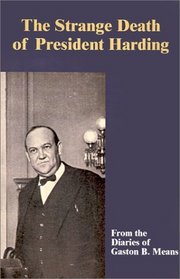Search -
The Strange Death of President Harding
The Strange Death of President Harding
Author:
Awesome inside-track from the diaries of Gaston B. Means and his the Department of Justice Investigations. Means asserts that Harding was poisoned. Mrs. Harding employed Gaston Means as a private detective in 1921. Teapot Dome was breaking. The scandal took its toll, and by the spring of 1923, Harding was visibly distraught at what he regarded a... more »
Author:
Awesome inside-track from the diaries of Gaston B. Means and his the Department of Justice Investigations. Means asserts that Harding was poisoned. Mrs. Harding employed Gaston Means as a private detective in 1921. Teapot Dome was breaking. The scandal took its toll, and by the spring of 1923, Harding was visibly distraught at what he regarded a... more »
ISBN-13: 9780898755978
ISBN-10: 0898755972
Publication Date: 9/2001
Pages: 316
Rating: ?
ISBN-10: 0898755972
Publication Date: 9/2001
Pages: 316
Rating: ?
0 stars, based on 0 rating
Publisher: University Press of the Pacific
Book Type: Paperback
Other Versions: Hardcover
Members Wishing: 1
Reviews: Amazon | Write a Review
Book Type: Paperback
Other Versions: Hardcover
Members Wishing: 1
Reviews: Amazon | Write a Review
Genres:




